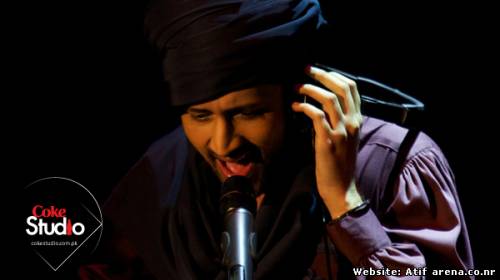|

INSTEP REVIEW….The age old poetry of Bulleh Shah that gave Nusrat
Fateh Ali Khan that hugely popular qawwali becomes the first smash hit
of Coke Studio Season 5 Karachi
Coke Studio season is always lovely. For the past couple of years
this is the show that has been giving Pakistani music its biggest hits
and brightest stars. While one does not have the patience to sit and
wait for it on the various channels that it is being shown, it is always nice to go through YouTube
and flip through what is on offer. At the time of writing this, Monday
afternoon, May 14, Atif Aslam and Qayaas’ rendition of ‘Charkha Nolakha’
is by far the biggest hit to come out of the first episode. Last night, a little over 50,000 people had watched it, within less than a day and by this morning, the number had shot up to well over 100,000 hits on YouTube. Now that’s what we call a phenomenon!
Most of the people would have logged on to see Atif Aslam in action,
dressed in a black Baloch get up, that some find a little strange and
others love, Atif’s charisma is undeniable. He is a hit song factory on
both sides of the border and a crowd puller and pleaser all around the
world. The hordes tune in for him, and when he sings a folk song like
‘Charkha Nolakha’, that audience will double, the power of Sufi kalam is
such.
The last time one heard ‘Charkha Nolakha’ was on Rahat Fateh Ali
Khan’s album Charkha, where it was a grittier, harsher rendition. The
one Atif Aslam and Qayaas have undertaken is more melodic, whether it is
Atif’s husky rendering of the verse that alternates between fast and
slow and Umair Jaswal’s controlled progressive rock performance that he slowly builds up to a shrieking crescendo without ever going out of control. The combination of Atif, Pakistan’s most successful pop musician with Umair Jaswal, the lead singer for Qayaas, the grittiest progressive
rock band around, is pure magic. It’s a thoughtful piece of music, well
put together with both bouncing off each others energy even as they
create space for the other to perform.
So how did this happen? Collaborations are often difficult to put
together especially with temperamental artists. Rohail Hyatt, the man
behind Coke Studio tells us that Atif and Qayaas wanted to collaborate. It was Sarmad Ghafoor who is a Qayaas band member and has also been playing guitar
for Atif for the longest time who was the common factor. Atif and
Qayaas told Rohail that they wanted to do ‘Charkha’ together, and Rohail
was very excited because he though it was ‘Mera Ey Charkha Nolakha
Kurre’ – the Nusrat qawwali. It turned out that they had thought of
doing another ‘Charkha’ and Rohail suggested ‘Charkha Nolakha’ to them
because he felt it would translate better into the rock that both Atif and Qayaas are known for. He was right and how.
‘Charkha Nolakha’ is haunting and electrifying at the same time. It works because both singers get the gist of it and play with
it within the parameters of the poetry. Disasters can happen if singers
don’t get the song – remember Quratulain Baloch and Bilal Khan’s cringe
worthy duet of the iconic Alamgir anthem, ‘Dekha Na Tha’? After Ali
Zafar’s brilliant ‘Allah Hoo’ and ‘Dastaan e Ishq’, two contemporary
musicians have paid fitting
homage to a powerful folk classic keeping its intensity and integrity
intact. If you haven’t heard ‘Charkha Nolakha’ yet, we suggest you tune
in. This one’s a gem for both folk lovers and progressive rock fans – rarely the two genres come together to create such a scorcher.
{Via: Insteps - The news}
|